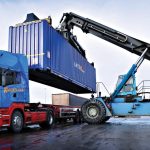The Madness of King Trump

The global effects of the US import tariff hikes have already been felt in South Africa
Cyril Ramaphosa must have thought he had it (relatively) easy. Going into 2018 as elected president, consumer confidence appeared to be up, business confidence couldn’t ostensibly go any lower, and investment growth was bound to return after a good few years of sweating fleet assets.
Even better, the rand was stronger against the dollar, inflation was falling, and the malaise of Jacob Zuma’s presidency finally started to appear in the rear-view mirror, as the new president promised to get tough on corruption. Indeed, it was something the investment community desperately wanted to hear.
Unfortunately, only a few months into his tenure, the United States took the decision to start raising tariffs on imports from friend and foe alike. The strange part about President Trump’s decision to invoke a trade war is that it falls in direct conflict with his policy of “America First”…
Raising tariffs on imported raw materials raises the cost of goods for the American producer, which could reduce demand for American-made goods. Further, reciprocal tariffs from China have hurt American exports – specifically in the heartland in Trump’s support base – pork and bourbon being among the exports targeted by China.
The global effects have been particularly hard on emerging markets. Since rhetoric began over increased trade protectionism, the rand has weakened significantly, breaching the level of R13,50 to the dollar in the last few weeks. The impact of the weaker rand has already been felt, with petrol rising to above R16 per litre in July and putting substantial pressure on consumer inflation.
Many observers expected the first two quarters of the year to be a period of strong recovery in the economic outlook. With it would follow an increase in business and consumer confidence, the purchasing managers index would rise and investment growth would pick up significantly – and, along with that, so would the demand for trucks.
Many in the industry would be looking to begin the replacement cycle. Since the beginning of the year, our own analysis suggests that the cost of transport products and parts has risen by between one and three percent. Transport operators living on tighter margins are likely to see these margins become constrained even further – one, as the petrol price rises and shows no sign of slowing, and two, as the price of imported components climbs while the domestic economy remains stagnant.
Trade wars, such as the one into which we are about to enter, have no victors. In South Africa, we have already seen the effect of earlier tariffs on our vehicle exports. Given our limited domestic heavy-vehicle manufacturing abilities, the transport industry will have to rely on more expensive components as the rand suffers. In many cases, this may delay the replacement cycle indefinitely.
Unfortunately, the experience with Trump’s economic policies has given little to suggest that common sense and logical thinking will prevail.
Published by
Sam Rolland
One Comment
Leave a comment Cancel reply
focusmagsa




This man is crazy, all kinds of crazy.